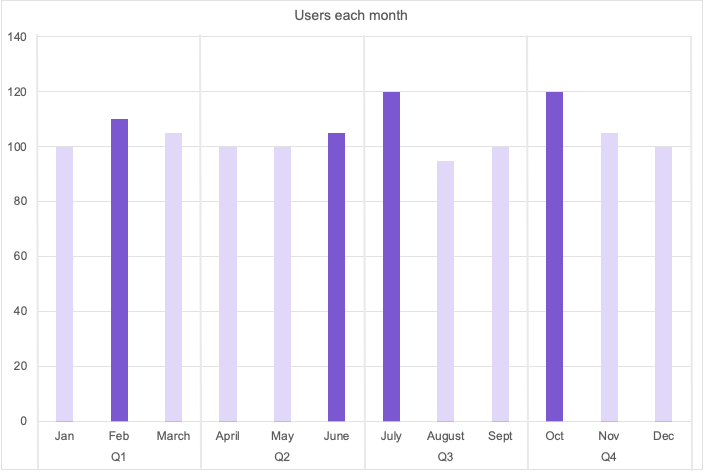Quarterly reconciliation and annual true-ups (PREMIUM)
GitLab reviews your seat usage and sends you an invoice for any overages. This review can occur:
- Annually. This process is also known as the annual true-up process. This process requires you to pay the full annual subscription fee for users added anytime during the year.
- Quarterly. With this process, you pay only for the remaining period of your subscription term.
Quarterly reconciliation vs. annual true-ups
Quarterly reconciliation can result in substantial savings.
Let's say in January you purchased an annual license for 100 users. This chart shows your usage during the year. The number of users went up and down, with 120 as the maximum. The dark purple indicates the most users you had each quarter.
If you are being billed annually:
- During the year, you went over the license by 20 users.
- If we pretend each extra seat is $100, then you pay $100 x 20 users.
Annual total: $2000
If you are being billed quarterly, you pay for the maximum number of seats you used during the quarter, and for only the remaining quarters.
Using the same example, if a seat is $100 per year, then it is $25 per quarter.
-
In Q1, you had a maximum of 110 users. 10 users over subscription x $25 per user x 3 quarters = $750 The license is now paid for 110 users.
-
In Q2, 105 users was the maximum. You did not go over 110 users, so no charge.
-
In Q3, you had 120 users. 10 users over subscription x $25 per user x 1 remaining quarter = $250 The license is now paid for 120 users.
-
In Q4, you had 120 users. You did not exceed the number of users. However, if you had, you would not be charged, because in Q4, there are no charges for exceeding the number.
Annual total: $1000
With quarterly reconciliation, you pay less annually.
If it's not possible for you to participate in quarterly reconciliations, you can opt out of the process by using a contract amendment. In that case, you default to the annual review.
Timeline for quarterly invoicing and payment
At the end of each subscription quarter, GitLab notifies you about overages. The date you're notified about the overage is not the same as the date you are billed.
GitLab SaaS
Group owners receive an email on the reconciliation date. The email communicates the overage seat quantity and expected invoice amount.
Seven days later, the subscription is updated to include the additional seats, and an invoice is generated for a prorated amount. If a credit card is on file, a payment is automatically applied. Otherwise, an invoice is sent and subject to your terms.
Self-managed instances
Administrators receive an email six days after the reconciliation date. This email communicates the overage seat quantity and expected invoice amount.
Seven days later, the subscription is updated to include the additional seats, and an invoice is generated for a prorated amount. If a credit card is on file, a payment is automatically applied. Otherwise, an invoice is sent and subject to your payment terms.
Quarterly reconciliation eligibility
You are automatically enrolled in quarterly reconciliation if
- The credit card you used to purchase your subscription is still linked to your GitLab account.
- You purchased your subscription through an invoice.
You are excluded from quarterly reconciliation if
- You purchased your subscription from a reseller or another channel partner.
- You purchased a multi-year subscription.
- You purchased your subscription with a purchasing order.
- You are a public sector customer.
- You have an offline environment and used a license file to activate your subscription.
- You are enrolled in a program that provides a free tier such as the GitLab for Education, GitLab for Open Source Program, or GitLab for Startups.
If you are excluded from quarterly reconciliation and not on a free tier, your true-ups are reconciled annually.
